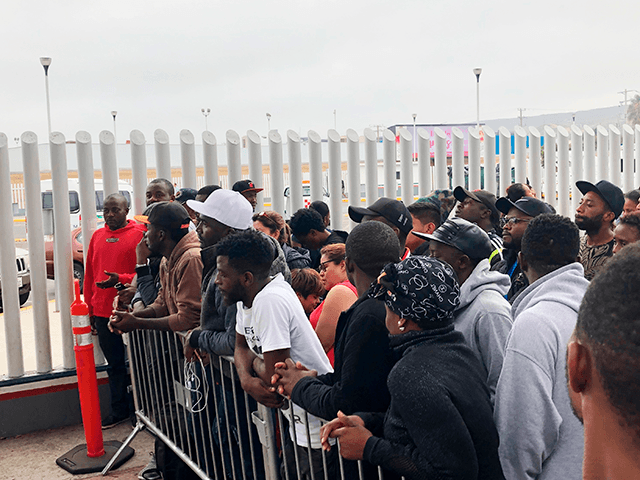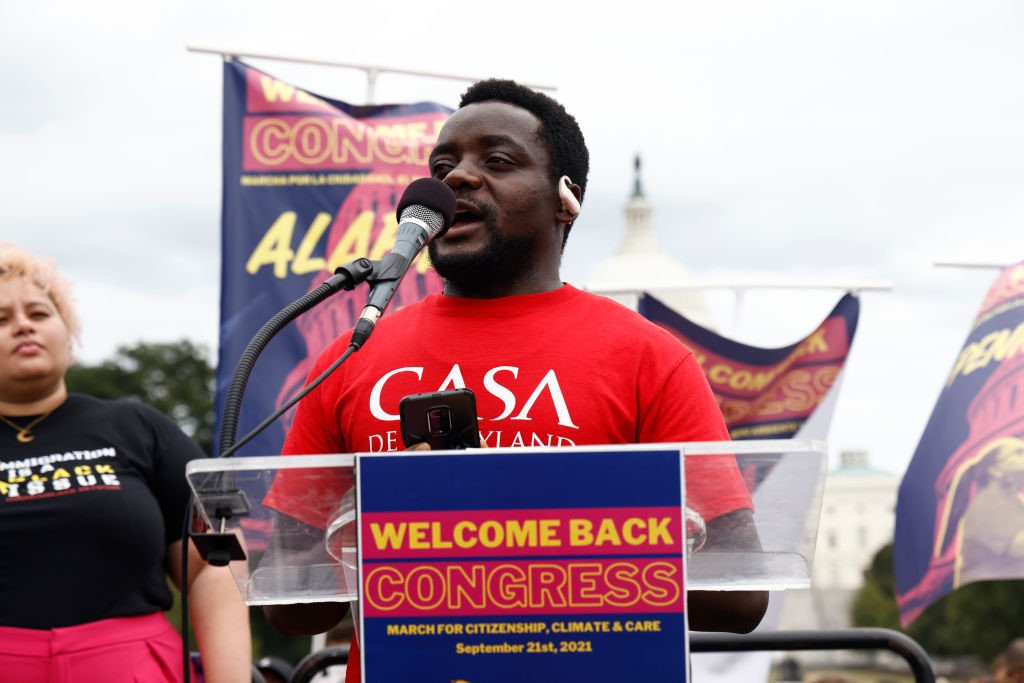President Joe Biden’s pro-migration border chief is rewarding roughly 40,000 African economic migrants by granting them work permits and legal status.
The decision announced Friday to grant Temporary Protected Status (TPS) to the migrants from Cameroon will help to extract more African workers, consumers, and renters for use in the U.S. economy, even as at least 10 million American men lack jobs.
“The United States recognizes the ongoing armed conflict in Cameroon, and we will provide temporary protection to those in need,” said a statement from Homeland Security Secretary Alejandro Mayorkas:
Cameroonian nationals currently residing in the U.S. who cannot safely return due to the extreme violence perpetrated by government forces and armed separatists, and a rise in attacks led by Boko Haram, will be able to remain and work in the United States until conditions in their home country improve.
The 18-month TPS benefit will likely be extended for many years, just like prior awards to illegal migrants from Central America.
Republican legislators rarely push back against the TPS program, because the program delivers more consumers, renters, and workers to businesses in their districts.
A trickle of Cameroonians entered the United States during President Donald Trump’s tenure. The migrants asked for asylum from fighting in their African homeland. But their asylum claims are legally very weak because international law requires refugees to seek sanctuary in the first safe country they reach — and the Cameroonians traveled through many safe countries to reach the United States.
The Cameroonian inflow has rapidly increased to roughly 40,000 since Biden dismantled border controls, partly because the new arrivals instantly use their cellphones to summon their relatives and friends to join them.

File/In this Sunday, July 28, 2019, photo, migrants in Tijuana, many from Cameroon, listen to names being called for those who can claim asylum that day in the US. (AP Photo/Elliot Spagat)
Mayorkas also encourages migration by releasing the migrants to get jobs instead of detaining them until their asylum cases are heard, as required by law.
Mayorkas returned less than a hundred of the economic migrants to their home country.
Through 2021 and into 2022, Mayorkas has welcomed roughly 1.5 million economic migrants across the southern border, alongside the inflow of temporary workers and legal immigrants. The inflow likely adds up to one migrant for every two births in the United States during the year.
His welcome for economic migrants hurts ordinary Americans by pressing wages downwards, pushing up housing prices, adding more chaotic diversity to U.S. politics, and crowding schools, hospitals, and other resources. For example, Americans’ real wages fell by almost 3 percent as Biden and Mayorkas inflated the U.S. economy with record spending and migrant inflows.
Mayorkas’s welcome is encouraging migrants from many countries to risk their lives on the tough trip to the U.S. border. A 2012 Gallup survey showed that 150 million people would like to migrate to the United States.

Austen, a Cameroonian asylum seeker, speaks as thousands welcome back Congress by marching for Citizenship, Care, And Climate Justice on September 21, 2021 in Washington, DC. (Photo by Paul Morigi/Getty Images for CPD Action)
Mayorkas has repeatedly suggested that he identifies himself with migrants, not with Americans.
In a June 2021 speech, he described the shock he felt when visiting a migrant camp in Kenya around 2010 that was filled with many thousands of destitute migrants from the chaotically diverse country of Somalia. He continued:
And I returned to the States asking a lot of fundamental questions, certainly about whether we could define ourselves as a civilized world or not, but also asking questions about myself … and the question of identity became much more profoundly important to me as an individual, as a son, as a brother, and as a father, and husband. But it also became very important to me, as a leader of an organization. And the issue of identity became the central question when we were wrestling with policy issues.
When we consider a particular policy question before us, doesn’t the answer help define our identity? Who we are, and more importantly, who we want to be?
The Cuban-born Mayorkas concluded in 2013 that Americans’ homeland “always has been, and forever will remain a nation of immigrants.” Only about one-third of Americans accept the “nation of immigrants” narrative, according to a survey by a pro-migration group.
“We are building an immigration system that is designed to ensure due process, respect human dignity, and promote equity,” Mayorkas tweeted in August 2021, as he sketched out his plans for easy-asylum rules that would encourage a mass migration of poor job-seekers into Americans’ homeland.
“Justice is our priority,” Mayorkas declared at a November 2021 Senate hearing, adding, “That includes securing our border and providing relief to those [migrants] who qualify for it under our laws.”
This year, Mayorkas has also developed plans to open the southern border on May 23 to all migrants who say they need asylum.
Since at least 1990, the D.C. establishment has used a wide variety of excuses and explanations — for example, “Nation of Immigrants” — to justify its economic policy of extracting tens of millions of migrants and visa workers from poor countries to serve as workers, consumers, and renters for various U.S. investors and CEOs.
The self-serving economic strategy of extraction migration has no stopping point. It is brutal to ordinary Americans because it cuts their career opportunities, shrinks their salaries and wages, raises their housing costs, and has shoved at least ten million American men out of the labor force.
Extraction migration also distorts the economy, and curbs Americans’ productivity, partly because it allows employers to use stoop labor instead of machines.
Migration also reduces voters’ political clout, undermines employees’ workplace rights, and widens the regional wealth gaps between the Democrats’ coastal states and the Republicans’ Heartland states.
An economy built on extraction migration also alienates young people and radicalizes Americans’ democratic, compromise-promoting civic culture because it allows wealthy elites to ignore despairing Americans at the bottom of society.
The economic strategy also kills many migrants, exploits poor people, splits foreign families, and extracts wealth from the poor home countries.
The extraction migration policy is backed by progressives who wish to transform the United States from a society governed by European-origin civic culture into a progressive-led empire of competing identity groups. “We’re trying to become the first multiracial, multi-ethnic superpower in the world,” Rep. Ro Khanna (D-CA), told the New York Times on March 21. “It will be an extraordinary achievement … we will ultimately triumph,” he insisted.
The award to Cameroonian migrants “is also a boost to US economy and will help stabilize the economy of Cameroon through increased remittances,” claimed Douglas Rivlin, a progressive spokesman for the business-backed America’s Voice pro-migration group.
Not surprisingly, the wealth-shifting extraction migration policy is very unpopular, according to a wide variety of polls.
The polls show deep and broad public opposition to labor migration and the inflow of temporary contract workers into jobs sought by young U.S. graduates.
The opposition is growing, anti-establishment, multiracial, cross-sex, non-racist, class-based, bipartisan, rational, persistent, and recognizes the solidarity that Americans owe to one another.

COMMENTS
Please let us know if you're having issues with commenting.